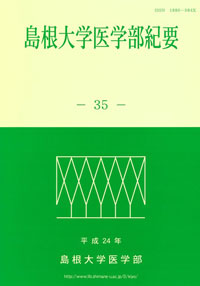島根大学医学部
ISSN:1880-084X

number of downloads : ?
Use this link to cite this item : https://ir.lib.shimane-u.ac.jp/40816
Bulletin of Shimane University Faculty of Medicine 40
2018-03-31 発行
配偶者を亡くした高齢者の看取りの思いと医療者からの情報提供との関連
Relationship Between the Information Served by Medical Staff and the Thinking About the End-of-life Care in Elderly Subjects Who Lost Their Spouse
Hosogai, Mizuho
Unnan City Hospital
Fukuma, Miki
Department of Fundamental Nursing
Osada, Kyoko
Former member of Department of Fundamental Nursing
File
Description
The purpose of this study was to clarify relationship between thoughts of patients' spouse
and information of medical staff in end-of-life care. The subject of this study was elderly patient's
spouse who had left more than one years. The data was collected about the thoughts of patients'
spouse and information of medical staff by the anonymous questionnaires. The spouse had received
to information, which were about the medical condition before the death (80.8%), the treatment on
end-of-life (65.4%), the mitigation of pain symptoms (51.3%), the method of care (35.9%), the
methods of post mortem care (33.3%), the care to the patient's mental (28.3%), the care to family
feelings (12.8%), and the consultation window after death (6.4%). Receive information was related
to spouse's comfort, and easiness of doing a question by nurse. The spouses who had satisfaction with
their end-of-life care received information on how to relieve symptoms of pain and death. The nurse's
information brings out the satisfaction of end-of-life care by elderly people who lost their spouses with
cancer. Thus, it was suggested that nurses have importance to recognize that their role is to provide
information.
and information of medical staff in end-of-life care. The subject of this study was elderly patient's
spouse who had left more than one years. The data was collected about the thoughts of patients'
spouse and information of medical staff by the anonymous questionnaires. The spouse had received
to information, which were about the medical condition before the death (80.8%), the treatment on
end-of-life (65.4%), the mitigation of pain symptoms (51.3%), the method of care (35.9%), the
methods of post mortem care (33.3%), the care to the patient's mental (28.3%), the care to family
feelings (12.8%), and the consultation window after death (6.4%). Receive information was related
to spouse's comfort, and easiness of doing a question by nurse. The spouses who had satisfaction with
their end-of-life care received information on how to relieve symptoms of pain and death. The nurse's
information brings out the satisfaction of end-of-life care by elderly people who lost their spouses with
cancer. Thus, it was suggested that nurses have importance to recognize that their role is to provide
information.
本研究では、がんで配偶者を亡くした高齢者の看取りの思いと医療者からの情報提供
の内容との関連を明らかすることを目的とした。1年以上前にがんで配偶者を亡くした高齢者を
対象に無記名自記式質問紙調査を行った。
配偶者が情報提供を受けていたのは、死期、亡くなる前の病状が80.8%、治療65.4%、苦痛症
状の緩和方法51.3%、世話の方法35.9%、遺体のケア33.3%、患者への精神的ケア28.2%、家族の
気持ちを楽にする方法12.8%、死別後の相談窓口6.4%であった。情報提供を受けることと看護師
の与える安心感や質問のしやすさと関連があった。看取りへの満足感があった高齢者は、苦痛症
状の緩和方法、死期に関する情報提供を受けていた。
がんで配偶者を亡くした高齢者の看取りの満足度には情報提供が関連することが明らかとなっ
た。したがって、看護師自らが情報提供を行う役割を認識することが重要であることが示唆され
た。
の内容との関連を明らかすることを目的とした。1年以上前にがんで配偶者を亡くした高齢者を
対象に無記名自記式質問紙調査を行った。
配偶者が情報提供を受けていたのは、死期、亡くなる前の病状が80.8%、治療65.4%、苦痛症
状の緩和方法51.3%、世話の方法35.9%、遺体のケア33.3%、患者への精神的ケア28.2%、家族の
気持ちを楽にする方法12.8%、死別後の相談窓口6.4%であった。情報提供を受けることと看護師
の与える安心感や質問のしやすさと関連があった。看取りへの満足感があった高齢者は、苦痛症
状の緩和方法、死期に関する情報提供を受けていた。
がんで配偶者を亡くした高齢者の看取りの満足度には情報提供が関連することが明らかとなっ
た。したがって、看護師自らが情報提供を行う役割を認識することが重要であることが示唆され
た。
Other Article
PP. 1 - 6
PP. 7 - 16
PP. 17 - 26
PP. 53 - 57
